#please read the full post
Photo







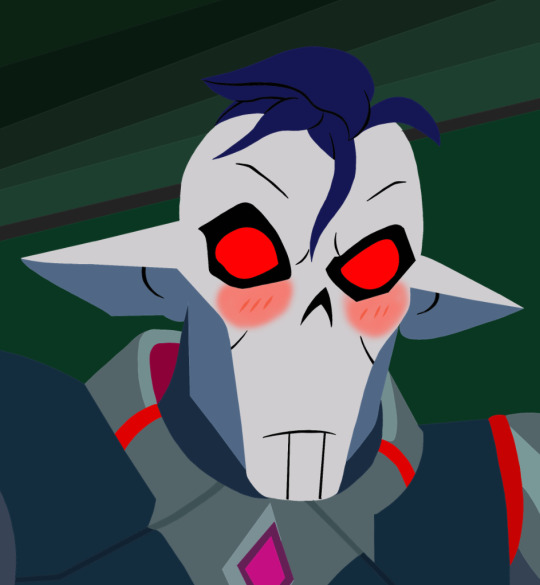

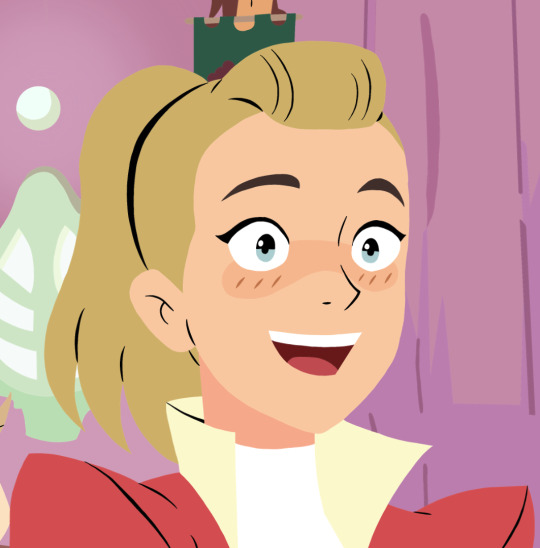
Hey so if you saw this post on my profile pic and thought it looked cool, here is some others I did a few years back (not redesigns though)
For those who don’t feel like reading the OG post, it basically talks about how my profile pic is basically a screenshot from the show that I edited slightly, traced over, then made a lineless version of. None of these are redraws, and I don’t want to pretend that they are.
These are basically edits that I put way too much effort into. I did these for fun and because I think they’d look neat.
You can also use them as profile pics if you want. Just maybe make a small post explaining that you got it from this post and also add a link. These were partially traced, but I put effort into that tracing, and while I don’t want full credit, I don’t want someone else to get credit for something nobody should get credit for!
Also, maybe tag me if you use it? Just because I do think it’d be neat to see someone use one of these.
(Here’s Part 2 btw)
#not au related#please read the full post#it has important context#i don't want people to think that these are completely original redraws#she ra#she ra and the princesses of power#netflix she ra#she ra netflix#she ra dreamworks#she ra and the princess of power fanart#spop#spop fanart#she ra fandom#she ra fanart#catra#kyle she ra#scorpia#double trouble#rogelio she ra#lonnie she ra#entrapta#hordak#glimmer she ra#adora#adora shera#she ra adora#lineless art
156 notes
·
View notes
Text
not to be all “think of the children” but the fact that companies can openly admit to using methods to intentionally form addictions in children and we’re not killing their ceos in the streets yet is astounding
#like what the fuck is a 'season pass'#bitch i'll kill you#hey people from the explore tab#read the full version of this post w/ my reblogs before you reply please? thanks#pastel's greatest hits
99K notes
·
View notes
Text
if you havent read this yet, what Aaron's friends have said about him, i think you really should. I don't tend to cry much but the words they shared about him have brought me completely to tears which i am wiping off my face as i type this.
My friend said that everywhere Aaron went, he planted trees. I imagine these seeds planted in our hearts and minds. They will sprout, and they will grow into giant strong trees with deep roots built to weather the many battles that lie ahead on this burning planet. They will remain upright, like Aaron did, until they no longer can, but by then their own seeds will have been planted in the hearts of our loved ones, and they will grow into trees as well. They will continue this struggle until the beautiful world that Aaron knew we deserved is born.
I don't think this quote is ever going to leave me, and i hope you take the time to let it stay with you too.
2K notes
·
View notes
Text
Quackity: These past days I've been in many calls, and I'm not done yet. I've spoken to a lot of people and creators. I've read your comments and I'm well aware of what needs to be done to carry out this project. I want to tell you all, beforehand, that for me the team's well-being is fundamental. I'm very involved in this topic to sort it out and I want to make that very clear. I want to tell you something... I want to tell you all that the administrative staff responsible for so much harm to the project has been fired. Specifically, those who made decisions without my permission, affecting the administrative and financial area of the project. Consequently, after this, I was in charge of doing a financial analysis that's carrying out for the QSMP.
Guys, to be really honest, it was not going to last. Therefore, I've had to make deep drastic structural changes that have lead me to reduce the performance of the server down to the most essential, and this is in order to ensure the well being of everyone involved in it. Having said this, I want to give a very important update: I want to let you all know that the QSMP will have to slow down temporarily. This is to ensure this new structure adapts to the project, because it's a restructuring that's taking place. I'm letting you know, and I reiterate, there are no voluntary positions inside the QSMP.
At the moment, there will not be any more individual update accounts of all 5 existing languages in the project. In any case, during this transition, there's going to be a temporal absence of all Eggs and NPCs. I know these are difficult changes, and I repeat, it's temporary until we adjust to these new conditions that will improve the performance of this new structure that's being made from scratch, both in the administrative and financial part. I'd like to reintegrate people fro the QSMP as time goes by if a financial viability can be found for the project Taking advantage of this update to tell you guys that within the changes of the server as it is, creators will have full control of their lore and stories. The team will not intervene in the way that it was being done. Moreover, efforts will be made to change the competitive dynamics inside the game so as to ease up the game style for the creators. Like I'm saying, all of these changes, and more, are being carrying out to have the project as best as possible, and they're being done little by little. This is a whole new structure that will ensure the best continuity and experience for the creators, the community and the team behind.
Guys, I want to make very clear that this is restructuring process, and again, it's not a fast one. The server being open does not mean everything's perfect, I understand that very well. Conversations will keep taking place, communication will continue and the constant improvement of the project as well. I ask, please, for everyone's patience and understanding regarding all changes. Please do wait for official announcements since a lot of incomplete and incorrect information is being spread. I want to tell you all something- if you don't trust in these changes or have many doubts about it, and don't want to consume any more of the project's content, I understand 100%. I have a personal commitment with the QSMP and I will work until it functions in the way it is supposed to do.
Lastly, I want to let you know that it was being worked on for months on finalizing the integration of Korean creators to the QSMP. For that reason, tomorrow we will be welcoming the new Korean creators of the QSMP, of course, taking into account all the changes I've just mentioned. I hope you can give the new Korean members warm welcome to the project. And as you know, their schedules are earlier. For everyone who would like to watch, they will be joining at 11am Mexico time and at 9am US time. Basically, I wanted to give that update regarding everything that's being done within the project. Again, thank you for your patience and understanding- these are necessary changes and I'm glad they're being done now. And many more things will keep being adjusted.
via @QuackitySubs
#Quackity#QSMP#QSMP Official#Translated#This is very long and I bolded parts to make it easier to read#but if there's a way to make it more accessible to folks lemme know!#I personally find the bolding thing helpful but I know everyone is different#Edit: got rid of the additional ''Quackity:'' bolded parts since that's unnecessary#since. you know. he's the only one speaking here#Quackity Subs also missed a few words in here so I added those in but otherwise this is exactly what was posted#Minus the part where they said ''fro''#I don't know if they meant for or from but that's a very vital difference so I'm leaving that as-is#IMO: It's reassuring hearing the full statement#''Please do wait for official announcements since a lot of incomplete and incorrect information is being spread''#is an especially important reminder#There has unfortunately been a lot of misinformation and catastrophizing / doomposting going around#I understand it's a very scary stressful time for many people#and it sucks being told to be patient#but we actually DO need to be patient if we want to get actual accurate information
784 notes
·
View notes
Text
A Bimbo Huntress (Open RP; All Muses allowed)

Pyrrha strutted into the seedy club, her dress hiding nothing. A week ago, something had happened to her, and she had woken up in her apartment, all of her curves, tits and her ass having gotten bigger. Something monster related should have concerned her, but all she could think about was massive cocks and pussy.
And as she entered the club, the bimbo looked around, not caring who took her, only that she would have a fun time. (Go wild with her)
@a-fantastic-time @freeusemuses @asexxxualerotica @ask-jaune-npr @sexycitadel @sins-of-warriors
521 notes
·
View notes
Text
Vash and Femininity: Trigun Stampede and its Themes of Bodily Autonomy, Exploitation, and Vague Gender Fuckery
alright sit the fuck down. we're gonna talk about THEMES
I was on Twitter- terrible idea usually, but a couple people I follow made some tweets that got me thinking about Trigun's overall themes, and here we are. So let's talk about some themes in Tristamp! And I'll take a couple looks at Trimax as well, just for fun :3
Let's look at how the showrunners utilize gender roles and exploitation of feminine characters to show how unhealthy Knives' obsession with his ideal of Vash is, and how horrific his exploitation of Vash and the Plants is.
Vash, from the beginning of Tristamp, is someone who cares about people's choices. When people kill others in front of him, he reiterates that whether someone lives or dies is not another person's choice to make. This is something he learned from Rem (a prominent female figure in his life). He refuses to kill people because that is not his choice to make. To kill someone is the ultimate removal of their bodily autonomy. They can no longer make any choices at all; they're dead.
Vash is also someone who has almost no choice in what path his life takes. He's constantly dragged around by outside forces, namely situations that are caused by Knives (which we'll get into later). Vash doesn't make things happen, things happen to Vash. The majority of events that occur are not his fault. He's pushed and pulled in a thousand different directions. His entire life is completely out of his control.
This can be seen as early on in his life as the Fall, something he had no control over and had no idea he even had a part in. Even later, in the ship with Luida and Brad, after he's been rescued from the desert, he's kept in handcuffs right up until he's shown to be of use to them and the Plant on their ship. After that, he could theoretically say "no, I don't want to go to other ships and heal their plants," but he doesn't. He's Vash. He's helpful and nurturing at his core, and these people have done so much for him just by letting him stay, so he'll do whatever they ask, no question.
This carries over into his adulthood. At Jeneora Rock, he goes to look at their Plant at one simple request, doesn't protest when he's dragged into a duel-- he doesn't take initiative unless someone's life is immediately at stake. He lets people tell him what to do and lets himself get dragged around by the wrist. He doesn't even pretend to have control over his life like Trimax Vash does, which I mean. Fair. Why pretend to have a grip on your existence when it's impossible to do anything without a gun pointed at your head?
Vash is a very passive character. He's nurturing, kind, gentle- he's a guy that fits a lot of very typical feminine character stereotypes. If you wrote this same story but made him a woman, I wouldn't bat an eye (but I would definitely be looking at it a lot more critically, what with the amount of stereotypically nurturing/motherly female characters in media already.)
This contrasts directly with Knives. He makes a decision and carries through no matter what stands in his way. He takes initiative. If Vash is a passive character, Knives is an active character. Wherever he goes, he leaves a lasting imprint. He makes shit happen! If outside forces make things happen to him, he'll go out of his way to make sure that particular force doesn't affect him again.
These two tweets I saw are what got me thinking about this originally. I just feel like here's a good place to put them as a segue into talking about episode 11.
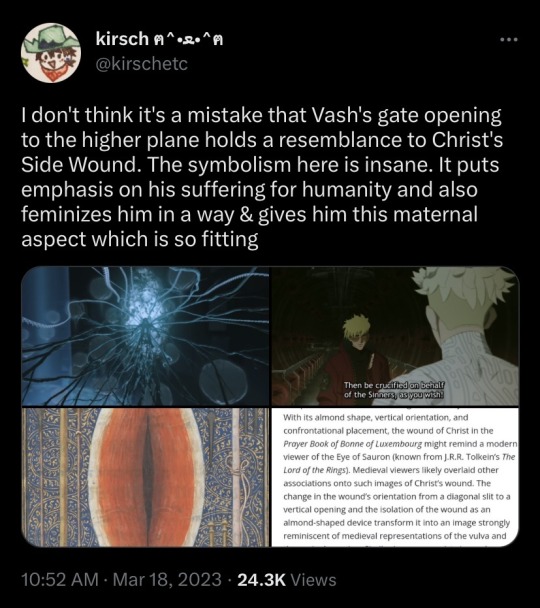
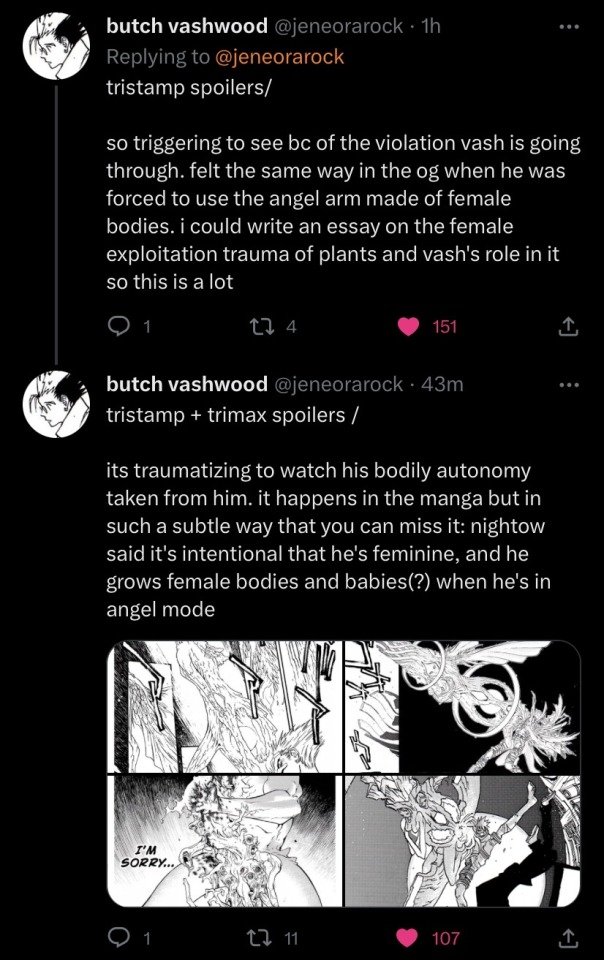
Episode 11 is where a lot of this feminine imagery really just. Explodes in your face. IT'S RIGHT THERE. You can't dance around it if you try. And it kind of reaches a peak when the connection reaches 100%, the gate opens, and. well. THIS happens to the Plants.

Plants, in both Trimax and Tristamp, are almost always typically feminine-looking. Knives and Vash are the only two who are male or even masculine at all. Knives, as the most masculine out of all of them, is the one trying to take charge, and mould the world as he sees fit, to a degree that is detrimental to both him and everyone else. And Vash-- passive, feminine, kind and nurturing, whose Angel Arm in the manga always sprouts decidedly feminine-looking Plant parts-- is the one being exploited for Knives' plans. It's no mistake that they made the giant plant formation at the end of ep 11 look like a giant woman that almost resembles Rem.
Vash wants people to make their own choices and keep their autonomy when it comes to their bodies and lives. Knives is the exact opposite. He wants all Plants to become independent and he uses Vash to achieve that goal, without asking what Vash wants or even knowing what the Plants themselves would prefer. He exploits Vash for the soul purpose of trying to make these Plants have Independent Plant babies. He's completely incapable of seeing that his choices are not for the greater good! He thinks he's saving them, but none of his actions are for the good of anyone but himself. He’s just violating them for his own gain.
They're really leaning into gender roles for these guys, but in a way that screams "HEY, LOOK AT THIS! ISN'T IT FUCKED UP? LOOK AT HOW FUCKED UP THAT IS. LOOK AT THIS, AND BE UNCOMFORTABLE, AND KNOW THAT IT IS FUCKED UP."
Because it is! It's so extremely fucked up. They're using this imagery and these roles, something that makes most of us intrinsically uncomfortable, to drive home how unhealthy Knives relationship with his ideal of Vash is. That's the point. We're supposed to be uncomfortable with this.
Now of course there's some nuance to it. Like, you could see Knives as somewhat of a feminine and/or queer-coded figure as well, ESPECIALLY if you look at some of his panels in the manga, which could in turn lead to themes about infighting and control within marginalized communities, but that might be something for another post. :3
And there's definitely different ways you could take this! Vash, with all this feminine imagery, could be either transfem or transmasc coded, depending on what way you'd rather see it, which could lead into themes of how people outside the norm constantly face a lack of bodily autonomy and are exploited for purposes outside their boundaries. We could also look at Wolfwood and his lack of choice over joining the Eye of Michael and becoming the Punisher, and how masculine men (particularly men of colour) are often forced into violent roles against their will. If we look at Trimax, the exact same could be said for Livio/Razlo and people with disorders such as DID/OSDD.
There are many different ways you could spin these themes, some of which I don't feel personally qualified to discuss. If anyone who is qualified to talk about Wolfwood or Livio/Razlo or even other characters related to these themes, then god PLEASE add onto this post or make a post and tag me or something. I would love to read it!
Anyway, in conclusion: Vash is a feminine figure constantly taken advantage of and exploited and and he's so incredibly trans/nonbinary-coded that it drives me insane. Thank you
#whiskeys word soup#trigun#trigun stampede#HI. HELLO. THIS DRIVES ME INSANE PLEASE READ THIS#and seriously if anyone wants to make a post about wolfwood or livio/razlo or any other character exploring these themes of bodily autonomy#on GOD. lemme know i wanna read it#well aware that some of this is probably me digging too deep for things that aren’t there but still!!! fun to look at#what is media analysis other than putting on ur queer glasses and picking out trans allegories within stories#it’s been a while since I’ve made a full analysis essay kinda post!! this is how i normally format them bc it’s easier for me to read
2K notes
·
View notes
Text
so about the header that proceeded today's statement:
Viability as agent: Low
Viability as subject: None
Viability as catalyst: Medium
i didn't know what to think of this part of the entry at first, but the longer the statement went on... was the institute in this universe trying to manufacture avatars?
the dice can't do anything without someone to use them, they can't be an "agent" by themselves, but might be capable of manipulation, so in that aspect their viability is "low."
the dice could be a "subject" in the sense that they could use further studying, but the statement itself was a very thorough investigation of their workings, so in that aspect their viability is "none."
the dice seem to influence their holder to roll them, or at least find more victims to roll them, and could therefore be described as a "catalyst" for someone's becoming. but, as seen in the statement, their owner can give the dice to someone else (albeit not without consequences), so in that aspect their viability is only "medium."
so what about the line following all this, what does "Recommend referral to Catalytics for Enrichment applicability assessment" mean? if we go by this interpretation, i'd say it could mean the institute wanted to find a way to make the dice even more potent as an artifact, maybe even remove that pesky ability for their owner to reject them.
imho all of this this brings a whole new level of context to the events of episode seven, of unknown violent agents going after an influx of objects that seemed straight out of artifact storage. was that the nature of the titular "magnus protocol" first mentioned in episode four, the one that involved the starkwall group? containing or destroying potential artifacts before the institute could get their hands on them?
it also makes their "gifted kids program," and sam's link to it as one of the kids being studied, all the more horrifying to think about. was it not just avatars in general they were after, but child avatars specifically? no wonder gertrude got so defensive over the possibility of sam and celia dragging gerry back into the institute's business last episode, we all picked up on her clearly knowing more than she's letting on but now we might know the shape of that information a bit better.
and one final bit of food for thought... this statement had a lot of familiar themes, didn't it? free will or the illusion of it, gambling and not-so-random chance, the statement giver being done in by one final hit from what feels like a bit of an addition... all hallmarks of a certain mother of puppets. doesn't it seem fitting that "chester" would use this kind of statement to warn sam about what harm pursuing the magnus institute could bring to him, considering the one his voice might draw from? and doesn't it seem so painfully ironic that his warning seems to have only driven sam further into that web?
#tmagp#the magnus protocol#tmagp spoilers#tmagp 9 spoilers#MANY THOUGHTS HEAD FULL AAAAAAAAAA#there are so many other things i want to link to this but i also just want to post it asap to get other people's thoughts#honestly at the word 'catalyst' my mind went straight to mike crew using ex altiora to become an avatar of the vast#combing through lietners until he found one that fit#and the statement giver from mag 4 feeling like he had to specifically sell ex altiora to gerry or it wouldn't 'count'#i can't pull out the episode quotes every time i have a theory or it becomes a bit passé but know they are always on my mind#also that last paragraph just came to me in a vision while i was typing up the rest of this i hope it's not too far of a reach#i tried to keep it vague but i'm also imagining jon banging his head against the inside of a crt monitor in frustration r/n#i still need to read the breakdown of the arg so if any info in that bolsters or discredits this please let me know!!!
304 notes
·
View notes
Text
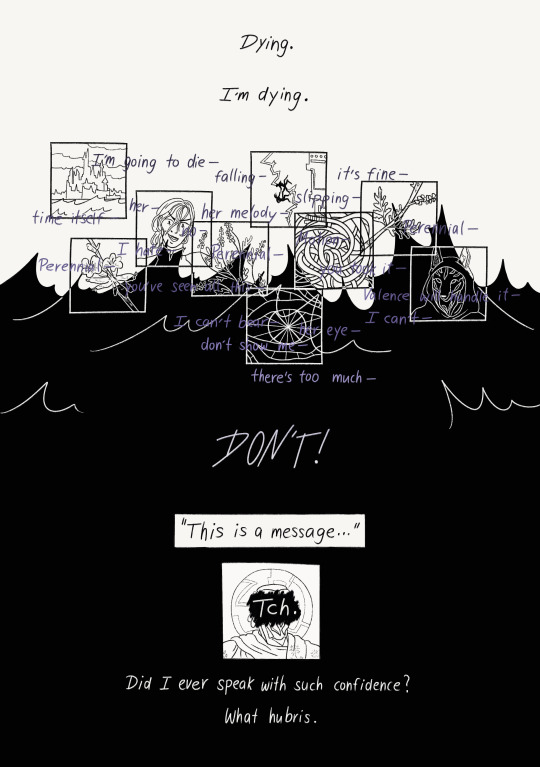
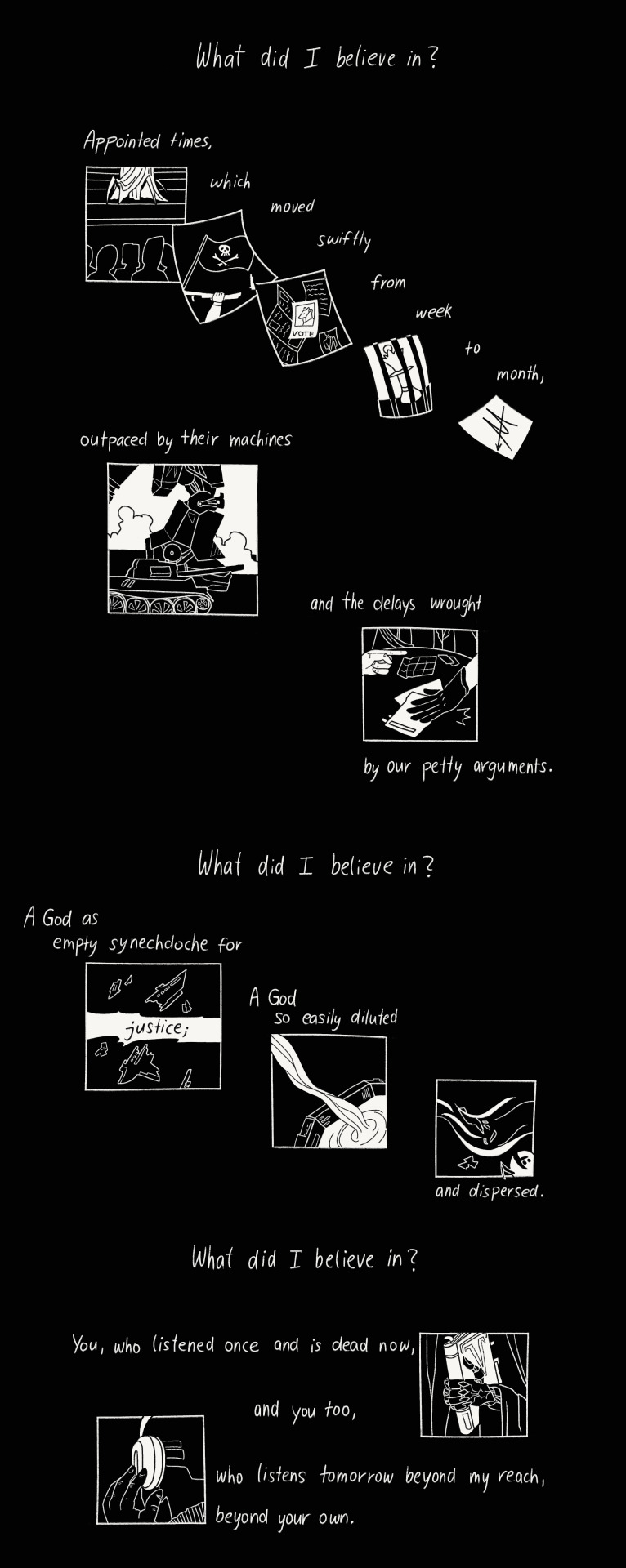
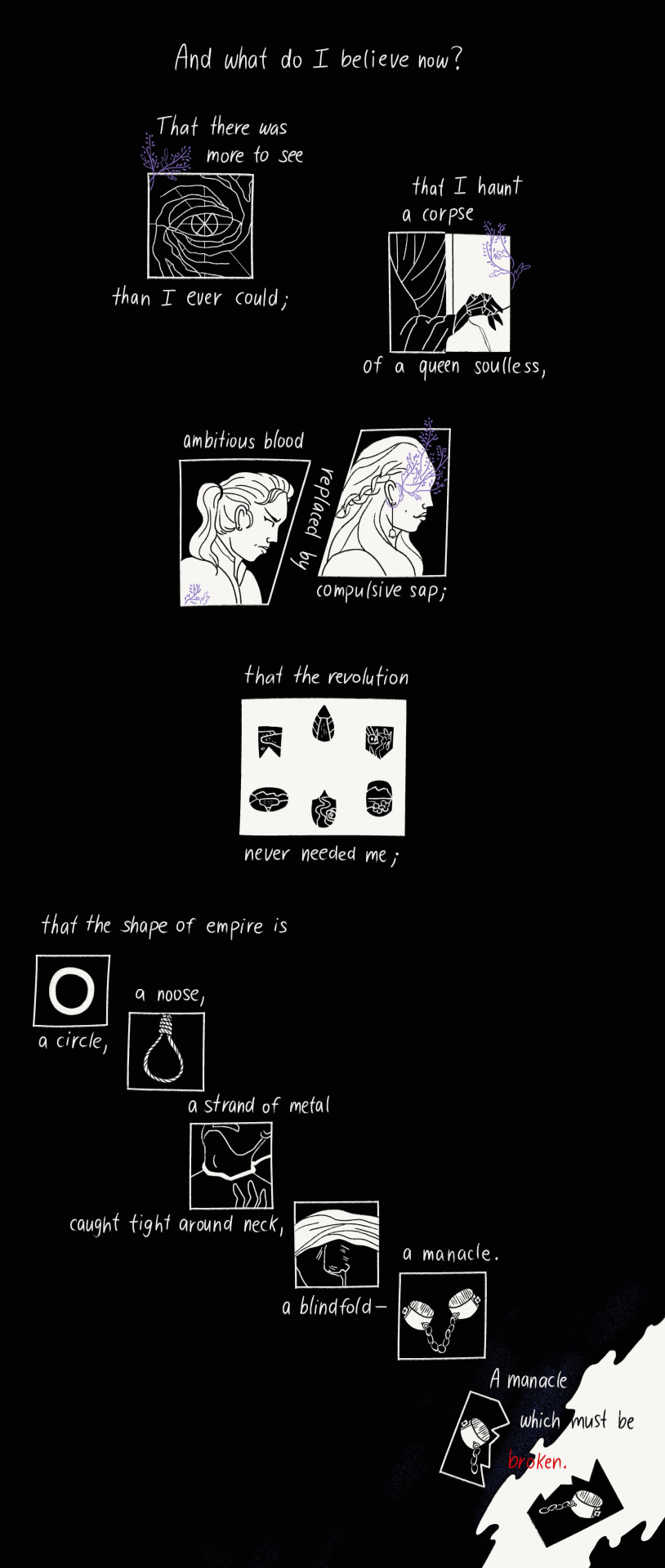

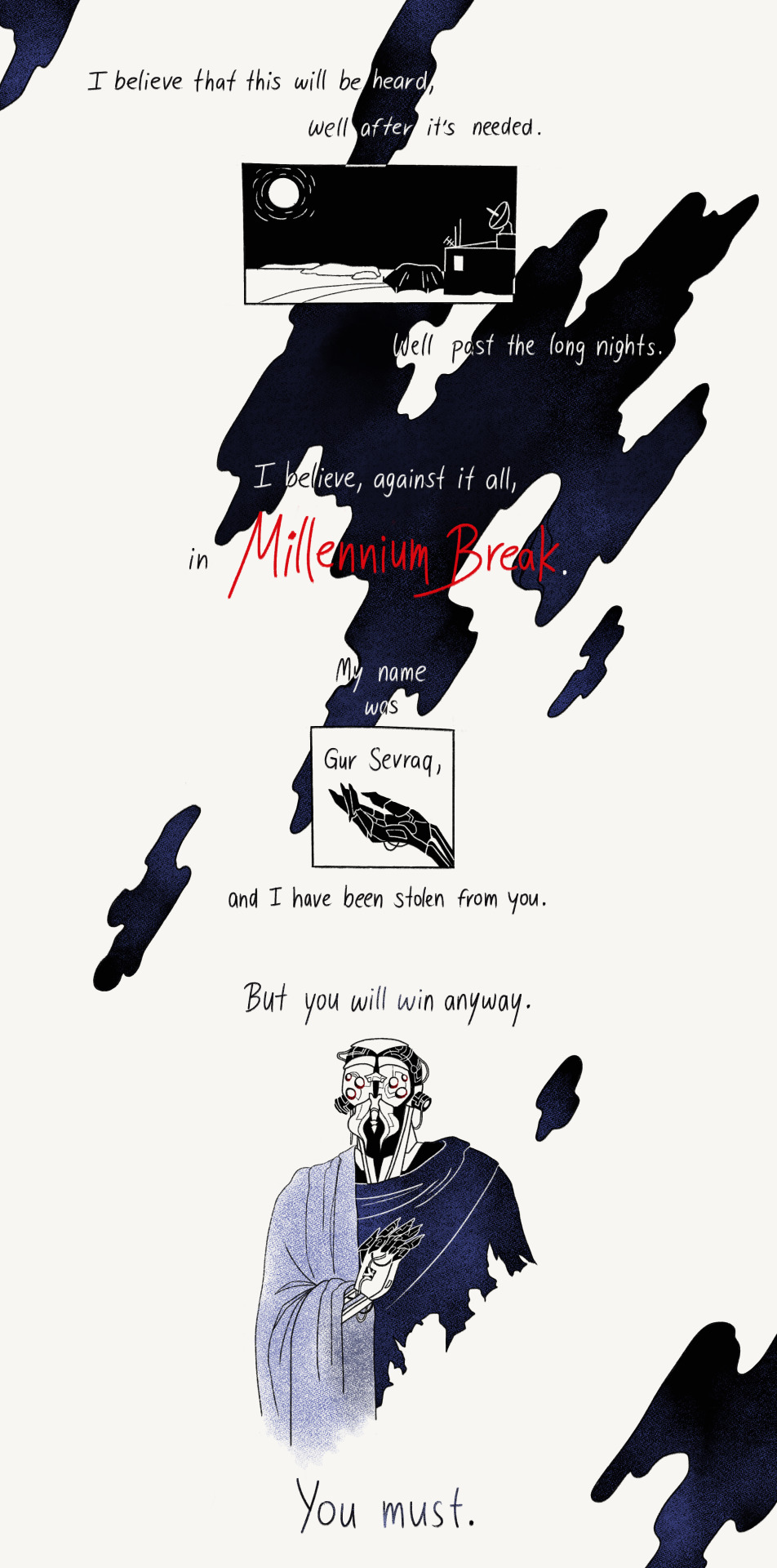
"[high pitched and tinny] Let’s dive in. Let’s dive in. It’s time to dive in. Get ready to [audio distorts and slows] dive. Diiive. Diiiiie…"
(The Road to PALISADE 20: City Planning Department)
so that's what i've been working on for the past 2 weeks!
i wanted to draw something for this intro ever since i first listened to it (as a companion piece to my other gur drawing, though it of course ended up being way bigger in scale), but it only really gripped me about halfway through PALISADE ep 18.
the next morning after that i listened to this narration on repeat for about 45 minutes and then made a big sketch on 4 sheets of paper at my desk at work.
anyways, i haven't listened to the new episode yet but i think i'm probably ready for whatever they're gonna throw at us with the next sortie. i'm gonna believe, against it all, in millennium break. for gur
(i recommend listening along while scrolling!
+ transcript btw. if anything is hard to read)
#road to palisade#road to palisade spoilers#palisade#fatt#friends at the table#gur sevraq#<- yuore everything btw.#long post#and good god. it sure as fuck is#rosa art#the full file for this? that i had to split up? its 30000 pixel tall. thats 218cm#im so proud of this & it was a ton of fun. ooohhh my free floating panels i love them#i posted about my progress (theres some earlier sketches n lineart too) on cohost to be like well.#maybe i wont talk so fucking much on the actual post but noooo i cant shut up#love that for me.shoutout if you read all this#if you find a typo please. dont even mention it#a fun thing about this is that i almost know the intro by heart now. theres like 3 lines i get stuck on but mostly. its all there#ill link the cohost if i reblog this again. personally i think its interesting stuff but i love to hear myself talk abt shit i make soooo#anyways i have art class tomorrow & should sleep soon : ) but im happy im finally able to show this off. it rules sooo much
430 notes
·
View notes
Text



20 year old Rin ilysm
(The demon/human cultural dissonance of Rin wanting to learn self defence so that she "doesn't have to rely of Lord Sesshomaru". To demons, the stronger ones in the clan protect the weaker ones and that's how it's supposed to be. The idea of Rin not wanting to be a burden doesn't quite compute to poor Sesshomaru. He's like tf? does she not think me capable any more ?? What have I done to lose her faith ??? )
#usual preface i have never watched/read yashahime#i'm simply obsessed with the post canon adult rin that lives in my head#inuyasha#rin#sesshomaru#jaken#sango#kagome#my arts#rhymeswithinuyasha#i feel like a classic older-rin trope is having her train to fight with sango#i'm feeling sess commissions her a pair of tanto knives made from his claws#please forgive me if i've botched the names but i like 'full moon' and 'new moon'#'Mangetsu' and 'Shingetsu'#both have poison blades#one is lethal the other is temporarily paralyzing
381 notes
·
View notes
Text


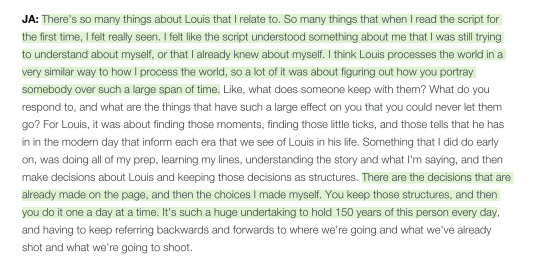


"I felt like the script understood something about me that I was still trying to understand about myself..."
#mazel tov girl#he is radically earnest#I too find this series incredibly cathartic#this is one of my favorite jacob interviews so please do go read the full thing!#jacob anderson#interview with the vampire#louis de pointe du lac#also this is not connected to my rolin post from earlier 💢#amc interview with the vampire#interview#long post
418 notes
·
View notes
Text
nico robin and her smile
hiiii ok has anyone else ever thought about the person robin was before joining the straw hats? like who she was when she was at her worst? because i do. a lot. so go along with me here
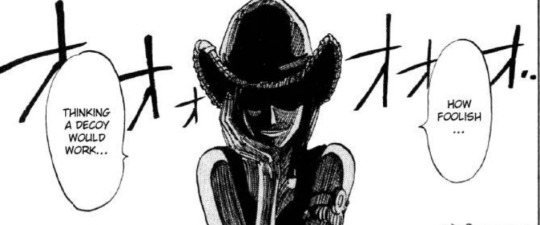
from her introduction, robin has this very small smile that feels cunning and is seemingly meant to taunt luffy and co. it creates a sense that there's a canyon's depth of difference in power between her and the others.
robin's is a subtle character in her expressions compared to most other major characters in the series. and i think it fits her background of having to work in subterfuge. (???)
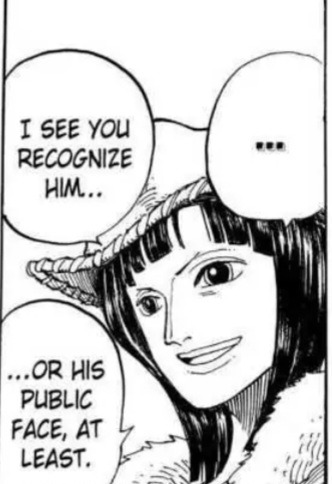
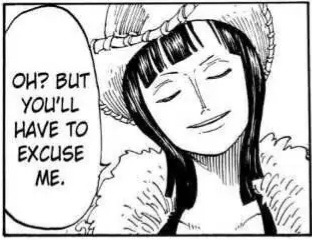

she maintains this expression throughout multiple scenes. the same shape of her smile that is so exact that it has to be with intention. this is the face of ms. all sunday. this is the person robin had to be in order to survive.
and yet each one still has it's differences and that's robin being not so perfect at hiding her true feelings (which btw i love that robin will always be exactly who she is). she's stressed or even strained at times. while also feeling perfectly at ease, but still performing a role.
i think for the most part. robin didn't mind what she had to do or who she had to be. because she's pragmatic, but she was definitely bothered by vivi and the strawhats. they're the ones who cause robin to show anything other than that static smile. notably when she is faced with vivi and luffy's determination.
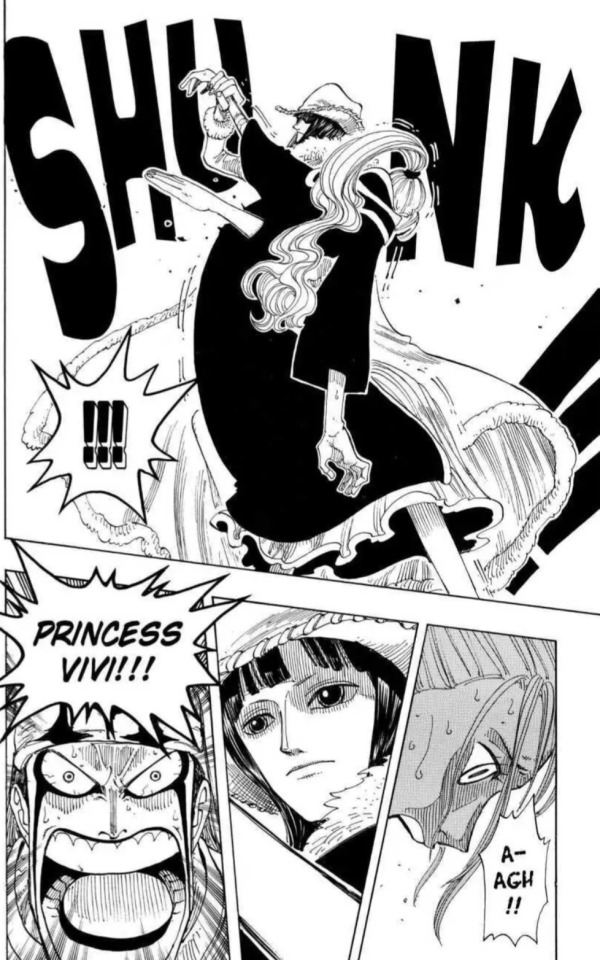
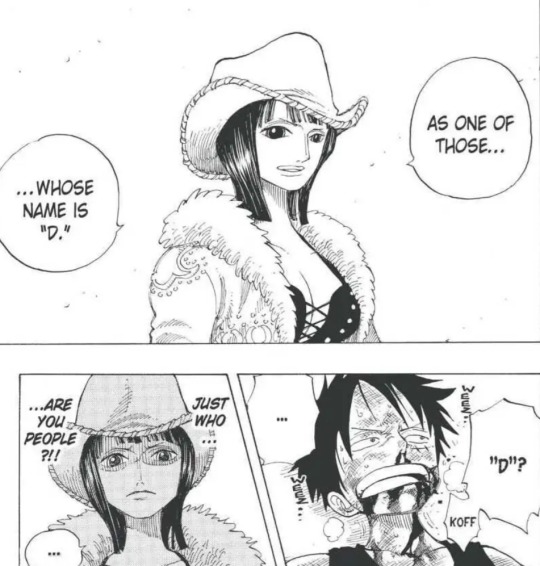
and i've rambled about it once before robin is a kind woman at heart and who has a soft spot for the crew + vivi. their earnestness breaks through her own desire/need to not care for the effect her actions have on the lives of others.
notably the only times robin does seem to genuinely smile is in small sudden outbursts around luffy when something he does makes her laugh.
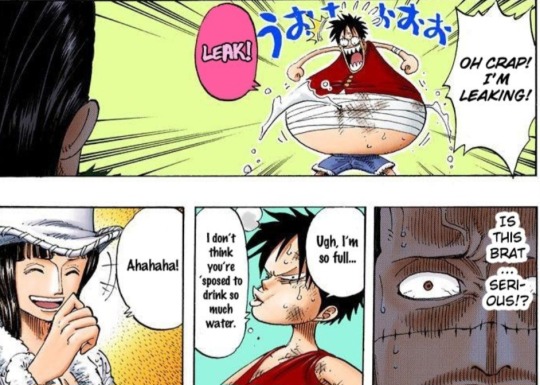
and throughout the rest of the alabasta arc. robin's clearly uncomfortable with facing the real destruction of alabasta at crocodile and her hands. later revealing that she never planned on helping him obtain the poseidon weapon. she never once smiles, instead dropping everything to focus on getting to the poneglyph.
after that though? she does her miss all sunday smile one last time when she asks luffy to join his crew. it's a famous panel, we all know it, we all love it.
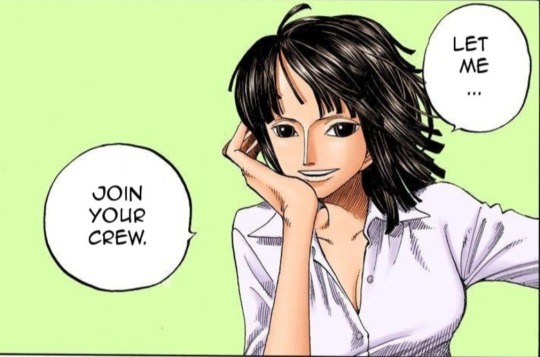
the longer robin was with the straw hats. the more she began to genuinely smile. it's well established that being on the crew brought back joy and laughter into robin's life, that being with them gave her a reason to live again. but it was a slow start until we got to see this robin more often and more freely who is cheered by everyone's bright youth and excitement in being alive in a ways that she never had been allowed.

#one piece#nico robin#i've been working on this one slowly but surely#please i hope this makes sense and i'm not like alone here#using inconsistent sources because i'm not the biggest fan of viz's translation but sometimes have to read it#i haven't read onigashima yet so i can't talk about it with surety just yet but robin also has the habit of using accessories to denote whe#she isn't being herself.#it's why robin stopped wearing the cowboy hats post w7/enies lobby. despite the fact that the she looked so good in it.#i think in onigashima (and vaugely post-ts when she's in hiding) it was her sunglasses btw#i thought this would be longer tbh and it could be but i got impatient and didn't want to wait til later#the full better version is the version of this is made as a total nico robin character study that tracks from her character intro to now
132 notes
·
View notes
Photo
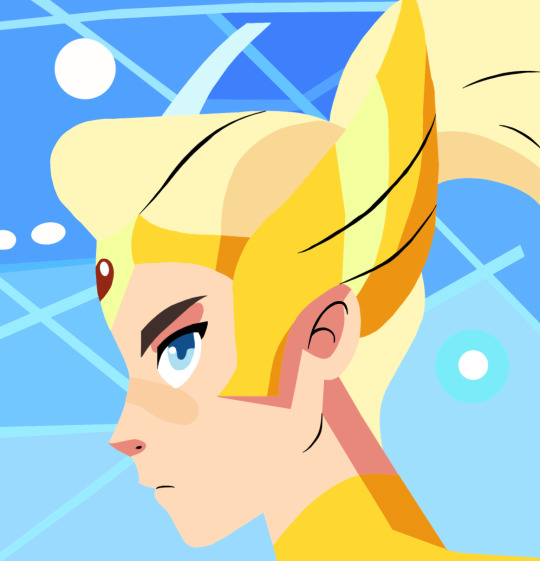

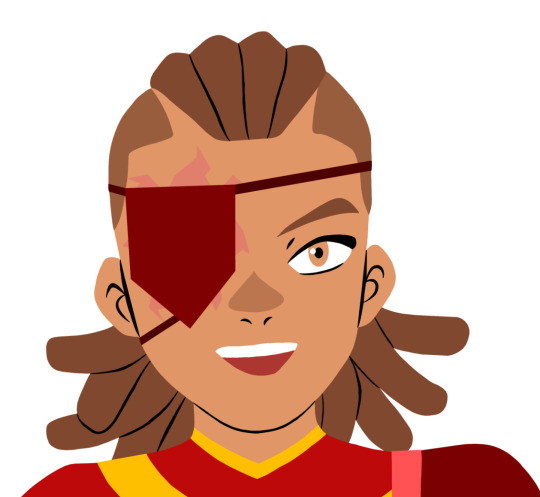
Hey, so here’s a part 2 to this post, now with even more pics!
So if you didn’t see that post explaining some important context for these pics, here’s what the post said (please read it all if you haven’t yet):
“Hey so if you saw this post on my profile pic and thought it looked cool, here is some others I did a few years back (not redesigns though)
For those who don’t feel like reading the OG post, it basically talks about how my profile pic is basically a screenshot from the show that I edited slightly, traced over, then made a lineless version of. None of these are redraws, and I don’t want to pretend that they are.
These are basically edits that I put way too much effort into. I did these for fun and because I think they’d look neat.
You can also use them as profile pics if you want. Just maybe make a small post explaining that you got it from this post and also add a link. These were partially traced, but I put effort into that tracing, and while I don’t want full credit, I don’t want someone else to get credit for something nobody should get credit for!
Also, maybe tag me if you use it? Just because I do think it’d be neat to see someone use one of these.”
(Don’t use the one of eyepatch Lonnie for a profile pic though. That one is specifically for my AU and I’m posting here simply so that ya’ll can see it better)
#not au related#please read the full post#it has important context#i don't want people to think that these are completely original redraws#she ra#she ra and the princesses of power#netflix she ra#she ra netflix#she ra dreamworks#she ra fandom#she ra fanart#shera#spop#spop fanart#lineless art#adora#spop adora#adora shera#she ra adora#she ra and the princess of power fanart#bow she ra#she ra bow#spop bow#lonnie#lonnie she ra#art#i spent way too much time on this#all for a shitty tracing thing#every time i do something like this i feel guilty even though i'm taking credit for it not being original
53 notes
·
View notes
Text

This idiot can't even win house of leaves¹
#1 i was gonna do blue text but you get the non-colour edition of the book#please buy the full colour version to unlock the intended vision for this post#dibi#house of leaves#myhouse.wad#(im sure the video will be an interesting watch)#i love this mod#i would argue you win house of leaves if you read the echo chapter at a slow pace taking in every sentence and enjoy iy#that or you just really like the poe album
232 notes
·
View notes
Text

psst.... guess who wrote one ishin fic and then immediately started in on a sequel?
#crime boys#my art#like a dragon ishin#please read these I worked so hard on them and crammed them so full of silly little notes and references#but uhh mind the tags they're really smutty#also please embiggen this pic and look at the details :')#to my irl friends: sorry for posting nothing but the same boys over and over again#simply pretend that you do not see this
193 notes
·
View notes
Text
The role of Pryce and Carter's Deep Space Survival Procedure Protocol Manual in the characterisation, symbolism, and themes of Wolf 359
TL;DR: The DSSPPM is used as a tool to help establish and develop Minkowski and Eiffel as characters: Minkowski as a strict Commander who clings to the certainty provided by a rigid source of authority like the DSSPPM, and Eiffel as the anti-authority slacker who strongly objects to the idea that he ought to read the manual. The way their contrasting attitudes towards the DSSPPM manifest through the show reflect their character development and changing dynamic. The DSSPPM can be directly used against the protagonists by those with power over them, and the reveal of its authorship gives a particularly sinister edge to its regular presence in the show. But it can be also be repurposed and seen through an individual interpersonal lens.
Note: There’s plenty that you could say about the DSSPPM through the lens of what it says about Goddard Futuristics as an organisation, or about Pryce and Cutter as people. Or you could talk about Lambert quoting the DSSPPM an absurd number of times in Change of Mind, and Lovelace’s reactions to this. But in this essay, I’ll be analysing on mentions of the DSSPPM with a focus on Minkowski, Eiffel, and their dynamic.
“One of those mandatory mission training things”: the DSSPPM as a tool to establish characterisation
The first mention of Pryce and Carter's Deep Space Survival Procedure Protocol Manual (the DSSPPM) in Wolf 359 is also the very first interaction we hear Eiffel and Minkowski have. In fact, the first time we hear Minkowski's voice at all is her telling Eiffel off for not having read the manual:
[Ep1 Succulent Rat-Killing Tar]
MINKOWSKI Eiffel, did you read your copy of Pryce and Carter?
EIFFEL My copy of what?
MINKOWSKI Pryce and Carter's Deep Space Survival Procedure Protocol Manual.
EIFFEL Was that one of those mandatory mission training things?
MINKOWSKI Yes.
EIFFEL In that case, yes, I definitely did.
MINKOWSKI Did you now? Because I happened to find your copy of the D.S.S.P.P.M. floating in the observation deck.
EIFFEL Oh?
MINKOWSKI Still in its plastic wrapping.
This is an effective way to establish their conflicting personalities right out of the gate. Minkowski's determination to "do things by the book - this book in fact" contrasts clearly with Eiffel's professed ignorance about and clear disregard for "this... Jimmy Carter thing”. Purely through their attitudes to this one book, they slot easily into clear archetypes which inevitably clash. Everything about Eiffel in that opening episode sets him up as a slacker who doesn't care about authority, but the image of his mandatory mission training manual floating in the observation deck "still in its plastic wrapping" provides a particularly striking illustration.
By contrast, we immediately encounter Minkowski as a strict leader who cares deeply about making sure everything is done according to protocol; the intense importance she places on the DSSPPM is one of the very first things we know about her. Her insistence on the importance of the survival manual might seem somewhat understandable at first, if perhaps unhelpfully aggressive, but it starts to feel less sensible as soon as we start to hear some of the tips from this manual:
Deep Space Survival Tip Number Five: Remain positive at all times. Maintain a cheerful attitude even in the face of adversity. Remember: when you are smiling the whole world smiles with you, but when you're crying you're in violation of fleet-wide morale codes and should report to your superior officer for disciplinary action.
The strange, controlling, vaguely sinister tone of some of the tips we hear in the first episode is largely played for laughs, emphasised by the exaggeratedly upbeat manner in which Hera reads them. But even these first few tips give us some initial suggestions that the powers behind this mission might not care all that much about the wellbeing of their crew members.
It says something about Minkowski that she places such faith and importance in a book which says things like "Failing to remain calm, could result in your grisly, gruesome death" and "when you're crying you're in violation of fleet-wide morale codes and should report to your superior officer for disciplinary action." (Foreshadowing the Hephaestus Station as the home of immense emotional repression and compartmentalising...) Having those kind of pressures and demands placed on her (and those around her) by people above her in the military hierarchy doesn’t unsettle Minkowski.
Eiffel groans and sighs as he listens to the tips, but Minkowski seems to see this manual as an essential source of wisdom. The main role the manual plays in this episode is to establish Minkowski and Eiffel as contrasting characters with very different approaches to authority and therefore a potential to clash.
When Minkowski demands that Eiffel reads the DSSPPM, he decides to get Hera to read it to him, asking her to keep this as “a 'just the two of us, totally secret, never tell Commander Minkowski' thing”. Eiffel seems convinced that Minkowski won't be happy with him listening to Hera read the DSSPPM rather than reading it himself. This suggests that (at least in Eiffel's interpretation) Minkowski’s orders are not just about her wanting him to know the contents of the manual, since this could theoretically be accomplished just as well by him listening to it. But she wants him to do things in what she’s deemed to be the correct way, to put in the right amount of effort, and not to take what she might see as a shortcut. It’s not just about the contents of the manual; it’s about the commitment to protocol that reading it represents.
“When in doubt: whip it out”: Hilbert’s use of the DSSPPM
In Season 1, the DSSPPM isn't purely associated with Minkowski. Hilbert actually quotes it more than she does in the first few episodes. In Ep2 Little Revolución, Hilbert's response to Eiffel's toothpaste protest is inspired by "Pryce and Carter six fourteen: “When in doubt, whip it out - ‘it’ being hydrochloric acid.”" This tip is absurd in a more direct obvious way than those we heard in Ep1. While this absurdity is partly for humour, it also casts further doubt on the usefulness of this supposedly authoritative survival manual, and therefore on the wisdom of trusting Command.
In Ep4 Cataracts and Hurricanoes, Hilbert starts to quote Tip #4 at Eiffel, who protests "I'm not gonna have one of the last things I hear be some crap from the survival manual". These moments again place Eiffel in clear opposition to the DSSPPM, but also suggest that Hilbert's attitude towards the DSSPPM - and therefore towards Command - is closer to Minkowski's than to Eiffel's.
When Hilbert turns on the Hephaestus crew in his Christmas mutiny, his allegiance to Command is revealed as dangerous. And here the DSSPPM comes up again. As Minkowski dissolves the door between her and Hilbert, she triumphantly echoes his own words back to him: "Pryce and Carter six fourteen: “When in doubt, whip it out - ‘it’ being hydrochloric acid.” Never. Fails." This provides a callback to a previous, more comedic conflict on the Hephaestus, and reminds the listener of a time when Minkowski and Hilbert were working together against Eiffel, in contrast to the current situation of Minkowski and Eiffel versus Hilbert. But it also shows that Minkowski, like Hilbert, is capable of using some of the more absurd DSSPPM tips to defeat an adversary. And it shows Minkowski leaning on those tips in a real moment of crisis.
Once Hilbert has betrayed the crew in order to follow orders from Command, we might look back on his quoting of the DSSPPM as casting the manual in a more sinister light, and again calling into question the wisdom of Minkowski placing such trust in it.
“It's not that I don't believe it, I'm just disgusted by it”: the DSSPPM as an indicator of a changing dynamic
The next mention of the DSSPPM is in Ep17 Bach to the Future:
MINKOWSKI Eiffel's been spot-testing me, Hera. He doesn't believe that I've memorized all of the survival tips in Pryce and Carter.
EIFFEL It's not that I don't believe it, I'm just disgusted by it. I keep hoping to discover it's not true.
MINKOWSKI Well, believe as little as you want, doesn't change the fact that I do know them. And so should you!
I think this provides an interesting illustration of the way in which Minkowski and Eiffel’s dynamic has developed since Ep1. They still have deeply contrasting attitudes to the DSSPPM, but this contrast is now a source of entertainment between them, rather than merely of conflict.
Given that Hera wasn’t aware of Eiffel testing Minkowski on the tips, we can guess that it’s a game they came up with while Hera was offline. In the midst of all the exhaustion and uncertainty and fear they were dealing with after Hilbert’s mutiny, this was a way they found to pass the time. It must have been Eiffel who suggested it; Minkowski cites his disbelief as the reason for the spot-testing. And yet she plays along, responding each time, even though this activity has no real productive value.
Minkowski is keen to demonstrate that she does know the tips and she emphasises that Eiffel ought to know them too, but their interactions about the DSSPPM in this episode have none of the genuine irritation and frustration that they displayed in Ep1. It feels almost playful and teasing. Eiffel still thinks Minkowski is "completely insane" for learning all the tips and is "disgusted" by her commitment to memorising them, but these comments feel much closer to joking about a friend's weird traits than to insulting a hated coworker's personality. It feels like something has shifted since Eiffel responded to Minkowski’s passion for the DSSPPM by saying “I'm so glad that your shrivelled husk of a dictator's heart is as warm as a decompression chamber”.
Another thing to note here is that Minkowski's respect for the DSSPPM has clearly survived Hilbert's Christmas mutiny and Minkowski's resulting distrust of Command. From Hilbert's behaviour at Christmas, it's clear that the crew's survival is not at the top of Command's priority list. But Minkowski still trusts the book that Command told her to read. She still thinks Eiffel should read it too. The main figures of authority above her are dangerous and untrustworthy, but she still clings to the source of guidance they provided her with.
It's also worth noting that Minkowski has not just learnt the advice in each of the 1001 tips, but she has memorised (nearly) all of them by number. If it was just about the information that the manual provides to inform responses to potentially life-or-death situations, then knowing the numbers wouldn't be necessary. Nor would it be particularly useful to know them all exactly word-for-word. Minkowski's reliance on the DSSPPM is again suggested to be about more than the potential practical use of its content. It's about showing that she is committed and disciplined and up to the task of leading. She does have some awareness of the strangeness of many of the tips, but this doesn't diminish the value of her adherence to the manual for her:
EIFFEL You're insane.
MINKOWSKI I'm disciplined. Although I will admit they do get more... esoteric as you go higher up the list.
There's only one tip Minkowski doesn't seem to remember, and that's revealing too:
EIFFEL 555?
Minkowski DRAWS BREATH - and STOPS SHORT. [...]
MINKOWSKI Hold on a second, I know this. (beat) Dammit.
EIFFEL Hey, look at that! Looks like there may be hope for you yet.
MINKOWSKI Quiet, Eiffel. Hera, what's D.S.S.P.P.M. 555?
HERA "Good communication habits are key to continued subsistence. Be in touch with other crew members about shipboard activities. Interfacing about possible problems or dangers is the best way to anticipate and prevent them."
This hangs in the air for a second. Then –
EIFFEL So you forget the one tip in the entire manual that's actually helpful?
MINKOWSKI Shut up.
Communication is a key theme of this show, so it’s interesting that this is the one tip Minkowski can’t remember, perhaps indicating an aspect of leadership and teamwork that she doesn’t always prioritise or find easy.
Eiffel saying “Looks like there may be hope for you yet” seems like just a throwaway teasing line, but it’s got a profound edge to it. A lot of Minkowski’s arc is about learning how to provide her own direction and support her crew outside of the systems of authority and hierarchy that she’s grown so attached to. So perhaps Eiffel is right to see a kind of hope in her failure to remember every single DSSPPM tip – she has the potential to break free of her reliance on external authority.
“Which one was 897, what was the exact phrasing of that Deep Space Survival Tip?”: the DSSPPM in interactions with Cutter
The Wolf 359 liveshow, Deep Space Survival Procedure and Protocol, is literally named after the manual. This suggests, before we’ve even heard/watched the episode, that the DSSPPM will be a key symbol here. Which is interesting because I'd say the liveshow has two main plot points: (a) Eiffel's failure to read the DSSPPM or follow orders in general, the resulting disruption to the mission, and his crewmates' frustration with this; and (b) the looming threat of Cutter, the necessity of keeping information from Command, and the risk of fatal mission termination.
Even without the knowledge that Cutter is one of the co-authors of the DSSPPM (which neither the Hephaestus crew nor a first-time listener knows at this point), there's a kind of irony in the contrast between these two plotlines. On the one hand, Minkowski repeatedly berates Eiffel for not having read Pryce and Carter's Deep Space Survival Procedure and Protocol Manual, which was made mandatory by Command. On the other hand, she is aware that Command in general - and Cutter specifically - represents the biggest threat to the safety and survival of her crew.
Cutter uses the DSSPPM against each of the Hephaestus crew in their one-on-one conversations with him. For Minkowski, he uses it as a way of emphasising the expectations and responsibility placed on her:
MINKOWSKI There are always gaps between expectation and reality, but--
CUTTER But it's our job as leaders to close that gap, isn't it? Pryce and Carter...?
MINKOWSKI 414, yes. Yes, sir, I know.
Cutter knows that Minkowski will know those tips and he knows abiding by them is important to her. She's quick to demonstrate her knowledge of the DSSPPM and agree with the tip. There's something deeply sinister to me about Cutter's use of the word 'our' here. His phrasing includes them both as leaders who should be ensuring that things are exactly as expected. It’s almost a kind of flattery at her authority, but it comes with impossibly high expectations. This way of emphasising the importance and responsibilities of her role as Commander is a targeted strategy by Cutter at manipulating Minkowski, designed to appeal to her values.
In Hera's one-on-one, Cutter uses a DSSPPM tip to interpret her behaviour and claim that he can read her motives:
CUTTER This thing you're doing. Asking questions while you get your bearings.
HERA Sir, I'm just curious about--
CUTTER Pryce and Carter 588: Shows of courtesy and polite queries are an efficient way to gain time necessary to strategize.
Unlike with Minkowski (or Eiffel), Cutter doesn't prompt Hera to demonstrate her knowledge of the manual. That wouldn't work as a power play against Hera, who would be able to recall the manual (or, rather, retrieve the file, however that distinction works within her memory) but who doesn't care about the DSSPPM like Minkowski does. Instead, Cutter implies that Hera’s behaviour can be predicted - or at the very least seen through - by the DSSPPM, which seems like a cruel attempt by Cutter at belittling her.
For Eiffel, Cutter uses the manual as a weapon in a different way again. He asks Eiffel, "which one was 897, what was the exact phrasing of that Deep Space Survival Tip?", something which Eiffel clearly doesn't know, but Cutter of course does. This puts Eiffel on the back foot, trying to defend and justify himself, allowing Cutter to emphasise his position of power yet again.
The DSSPPM plays a double role in the liveshow. On the one hand, as Minkowski reminds Eiffel, proper knowledge of the manual "would've saved [the crew] from these problems with the nav computer" – some of the tips can potentially save the crew a great deal of hassle, stress, and risk. On the other hand, the same manual is used by Cutter to manipulate, unsettle, and intimidate the crew. There are these two sides to the information given to the crew by Command - two sides to the manual which Minkowski still values.
In another duality for the DSSPM, the manual is sometimes used as a symbol of the relationship between the crew members and Command, and sometimes used to indicate the dynamics between the individual crew members, usually Minkowski and Eiffel. Before Cutter’s appearance in the liveshow, Minkowski and Eiffel’s discussions of the DSSPPM reflect interpersonal disagreements between two people with fundamentally different attitudes:
MINKOWSKI Oh come on, why do you think I keep trying to get you to go over these things? Do you think I enjoy going through them?
EIFFEL Yes.
MINKOWSKI Well, alright, I do. But this knowledge could save your life.
Minkowski enjoys rules, regulations, and certainty, for their own sake as much as for any practical usefulness. Eiffel very much does not. This is a simple clash of individuals, in which the link between the DSSPPM and Command is implicit. Minkowski doesn't seem to question the idea that the information in the DSSPPM is potentially life-saving, even though she knows Command don't care about their lives. But Cutter’s repeated references to the DSSPPM remind us who made that book a mandatory part of mission training – it certainly wasn’t Minkowski, even if she’s often the one attempting to enforce this rule.
At the end of the liveshow, in a desperate attempt to prevent mission termination, Eiffel promises Cutter that he will read the DSSPPM (the liveshow transcript notes that him saying this is "like pulling teeth"), an instance of the manual being used in negotiations between the Hephaestus crew and Command. All Minkowski’s orders weren’t enough to get Eiffel to read that book, but a genuine life-or-death threat might just about be enough. Perhaps it's ironic that Eiffel reads the survival manual out of a desire for survival, not because he thinks the contents of the book will help him survive, but because he’s grasping anything he can offer to buy the crew’s survival from those who created that same book.
In the final scene of the liveshow, Minkowski catches Eiffel reading the DSSPPM, and he fumbles to hide that he's been reading it, a humorous reversal of all the times that he's lied to her that he has read it. Perhaps admitting that he's reading it would be like letting Minkowski win. Minkowski seems to find both surprise and amusement in seeing Eiffel finally reading the manual, but she doesn't push him to admit it. There's some slightly smug but still friendly teasing in the way Minkowski says "were you now?" when Eiffel says that he was just reading something useful. In that final scene, the manual is viewed again through the lens of Minkowski and Eiffel’s dynamic – Command’s relation to the DSSPPM becomes secondary.
“The first thing I'd make damn sure was hard wired into anything that might end up in a situation like this one”: the DSSPPM as a tool of survival
In Ep30 Mayday, when Eiffel is stranded alone on Lovelace’s shuttle, he hallucinates Minkowski to bring him out of his helpless panic and force him into action. And this hallucination also brings with it one of Minkowski’s interests:
MINKOWSKI Eiffel... I worked on this shuttle. Reprogramming that console.
EIFFEL So? How does that help –
MINKOWSKI Think about it.
BEAT. And then he gets it.
EIFFEL Oh goddammit.
MINKOWSKI What's the first thing that I would do when programming a flight computer? The first thing I'd make damn sure was hard wired into anything that might end up in a situation like this one?
EIFFEL Pyrce and Carter's Deep Space Survival Procedure and Protocol Manual.
Again, a conversation about the DSSPPM gives us an indication of the development of Minkowski and Eiffel’s relationship. Not only does Eiffel imagine Minkowski as a figure of (fairly aggressive) support when he’s stranded and alone, he thinks about what advice she’d give him and he follows it. Rather than dismissing the manual entirely, he looks for tips that are relevant to his situation. He’s not pleased about his hallucinated-Minkowski trying to get him to read the DSSPPM, but that was what his mind gave him in an almost hopeless situation. Some part of him now empathises with Minkowski’s priorities in a way that he definitely wasn’t doing in Ep1. He thinks that the DSSPPM might be on the shuttle because he knows the manual is important to Minkowski. It’s by imagining Minkowski that he gets himself to read the manual in order to see if it can help him survive – he certainly doesn’t think about what Cutter or anyone else from Command would tell him to do.
In the end, the tips Eiffel picks out aren’t all that helpful or informative: “Confront reality head-on”; “In an emergency, take stock of the tools at your disposal. Then take stock again. Restock. Repurpose. Reuse. Recycle."; and “"In times of trouble, an idle mind is your worst enemy”. But Eiffel does use these tips to structure his initial thinking about how to survive on Lovelace’s shuttle. In an almost entirely hopeless situation, Eiffel finds some value in the DSSPPM. But since the tips he picks out are mostly platitudes, the actual wisdom that allows him to survive all comes from his own mind; the tips, like his hallucinations, are just a tool he uses to externalise his process of figuring out what to do.
“Wasn't there something about this in the survival manual?”: Minkowski potentially moving away from the DSSPPM
Given the significance of the DSSPPM in Season 1 and 2 to Minkowski in particular, it feels notable when the manual isn’t referenced. Unless I've missed something (and please let me know if I have), Minkowski – the real one, not Eiffel’s hallucination - doesn't bring up the manual of her own accord at all in Seasons 3 or 4. This might make us wonder if she’s moved away from her trust in and reliance on that book provided by Command.
Perhaps the arrival of the SI-5, which highlights to Minkowski that the chain of command is not a good indicator of trustworthy authority, was the final straw. Or perhaps the apparent loss of Eiffel - and any subsequent questioning of her leadership approach, or realisations about the valuable perspective Eiffel provided - were what finally broke down her faith in that book.
Alternatively, perhaps Minkowski still trusts the DSSPPM as much as ever, but trying to get Eiffel or any of the other crew members to listen to it is a losing battle that she no longer sees as a priority. Either way, Minkowski’s apparent reluctance to bring up the DSSPPM feels like a shift in her approach.
The associations between Minkowski and the DSSPPM are still there in Season 3, but they are raised by other characters, not by Minkowski herself. The manual is used to emphasise Eiffel’s difficulties when he’s put in charge of trying to get Maxwell and Hera to fill out a survey in Ep32 Controlled Demolition. Trying to force other people to be productive pushes Eiffel into some very uncharacteristic behaviour:
EIFFEL Jesus Christ, what is wrong with you? It's like you've never even read Pryce and Carter! Tip #490 very clearly states that –
He trails off. After a BEAT –
HERA Officer Eiffel?
MAXWELL You, uh, all right there?
EIFFEL (the horror) What have I become?
[...]
Eiffel, now wrapped up in a blanket, is next to Lovelace. He is still very clearly shaken.
EIFFEL ... and... it was like an episode of the Twilight Zone. I was slowly transforming into Commander Minkowski. [...] It was a nightmare! A terrifying, bureaucratic nightmare!
This is a funny role reversal, but it shows us the strength of Eiffel’s association between Minkowski and the DSSPPM, as well his extreme aversion to finding himself in a strict bureaucratic leadership position. It also suggests that becoming extremely frustrated when trying to get other people to do what you want might make anyone resort to relying on an external source of authority, such as the manual. I don’t know whether this experience helps Eiffel empathise with Minkowski, but perhaps it might give us some insight into how her need for authority and control in the leadership role she occupied might have reinforced her deference to the DSSPPM.
In Ep34, we get a suggestion of another character having a strong association between the DSSPPM and Minkowski. After the discovery of Funzo, Hera asks Minkowski what the manual says about it:
HERA Umm... I don't know if this is a good idea. Lieutenant, wasn't there something about this in the survival manual?
MINKOWSKI Pryce and Carter 792: Of all the dangers that you will face in the void of space, nothing compares to the existential terror that is Funzo.
It’s interesting to me that Hera asks Minkowski here. We know from Ep1 that “Pryce and Carter's Deep Space Survival Procedure Protocol Manual is among the files [Hera has] access to”. Two possible reasons occur to me for why Hera might ask Minkowski about the DSSPPM tip here. One possibility is that Hera thinks that retrieving the manual from her databanks and finding the correct tip would take her more time than it would take for Minkowski to just remember the tip. Which suggests interesting things about the nature of Hera’s memory, but also implies that - at least in Hera's view -Minkowski’s knowledge of the DSSPPM is more reliable than that of a supercomputer.
The other possibility is that Hera could have recalled the relevant DSSPPM tip incredibly quickly but she doesn’t want to, maybe because she resents having that manual in her head in the first place, or maybe because she wants to show respect for Minkowski’s knowledge as a Commander. Either way, we can see that Hera – like Eiffel – strongly associates Minkowski with the DSSPPM.
And Minkowski, even if she wasn’t the one to bring up the manual here, recalls the relevant tip immediately. Perhaps she is moving away from her trust in that manual, but everything that she learned as part of her old deference to the authority of Command is still there in her head. She might want to forget it by the end of the mission, but that’s not easily achieved. The way Minkowski’s friends/crewmates associate the manual with her emphasises the difficulty she’ll face if she tries to move away from it.
“One thousand and one pains in my ass”: The authorship of the DSSPPM
In Ep55 A Place for Everything, Eiffel effectively expresses his long-held dislike of the DSSPPM when he comes face-to-face with both of its authors:
EIFFEL What? What the hell are - wait a minute - Pryce? As in one thousand and one pains in my ass, Pryce? (sudden realization) Which... makes you...?
MR. CUTTER (holding out his hand) W.S. Carter, pleased to meet you.
It’s significant that the two ‘big bads’ of the whole series are the authors of the manual which Minkowski and Eiffel were bickering about all the way back in Ep1. It’s not the only way in which the message of this show positions itself firmly against just accepting externally imposed authority and hierarchy without question or evidence, but it does reinforce this ethos.
By being the authors of the manual, Cutter and Pryce have had a sinister hidden presence throughout the show. Long before we know who Pryce is and even before we hear Cutter’s name, their manual is there, occupying a prominent place in Minkowski’s motivations and priorities, and in her arguments with Eiffel. It’s not at all comparable to what Pryce put in Hera’s mind, but it is another way in which these antagonists have wormed their way into the heads of our protagonists.
Minkowski will have to come to terms with the fact that the 1001 tips she spent hours memorising and reciting were written by two people who would have killed her, her crew, and even the whole human race without hesitation if it served their purposes. We never get to hear Minkowski’s reaction to learning the identities of Pryce and Carter, but I think processing the role of their manual in her life will be a long and difficult road that’ll tie into a lot of other emotional processing she needs to do. Her assertion to Cutter that, without him, she is “Renée Minkowski... and that is more than enough to kick your ass!” feels like part of that journey. She doesn’t mention the DSSPPM at all in Season 4. She’s growing beyond it.
"Doug Eiffel's Deep Space Survival Guide": The DSSPPM as a weapon against those who wrote it
Last but not least, I couldn’t write about Eiffel and the DSSPPM without mentioning this scene from Ep58 Quiet, Please:
EIFFEL As someone once told me: "Pryce and Carter 754: In an emergency, take stock of the tools at your disposal, then take stock again. Repurpose, reuse, recycle." And right now? You know what I got? I got this lighter from when Cutter was using me as his personal cabana boy. [...] and I've got myself this big, fat copy of the Deep Space Survival Manual, and you know what I'm gonna do with it? [...]
Eiffel STRIKES THE LIGHTER. And LIGHTS THE BOOK ON FIRE, revealing Pryce just a few feet away from him!
EIFFEL I am going to repurpose it... and reuse it... and recycle it into a GIANT FIREBALL OF DEATH!
And he swings the flaming book forward, HITTING PRYCE ON THE SIDE OF THE HEAD. [...]
EIFFEL That's right! Doug Eiffel's Deep Space Survival Guide, B-
No one other than Doug Eiffel could pull off the chaotic energy of this moment. It doesn’t get much more anti-authority than lighting the mandatory mission manual on fire and using it as a weapon against one of its malevolent authors. It might not be the wisest move safety-wise, and it certainly doesn’t improve the situation when the node gets jettisoned into space. But there is still a powerful symbolism in taking a symbol of the hierarchical forces that have tried to constrain you for years and setting it alight to fight back against those forces. Eiffel takes his own approach to survival and puts his own name into the title, an assertion of his agency and rejection of Command's authority.
The DSSPPM tip that he uses here is one of those he considers when stranded on Lovelace’s shuttle. It’s understandable that after that experience it might have stuck in his memory.
I can’t help feeling that the line “as someone once told me” has a double meaning here. The immediate implication is to interpret “someone” as being Pryce and Cutter – it’s their manual after all – which makes this line a fairly effective ‘fuck you’ gesture, emphasising how Eiffel is using Pryce’s manual against her in both an abstract and a physical sense.
But I think “someone” could also mean Minkowski. Eiffel uses a singular rather than plural term, there’s already an association established between Minkowski and the DSSPPM, and, in Mayday, it’s his hallucination of Minkowski that gets him to read this tip. She's probably also recited this tip to him at other points as well. Under this interpretation, this line is as much a gesture of solidarity with Minkowski as it is a taunt to Pryce. I like the idea that these two interpretations can run alongside each other, reflecting the duality of the use of the DSSPPM that I talked about in relation to the liveshow.
Conclusion
The DSSPPM is a symbol of external rules imposed on people by those with power over them. These rules can be strange, arbitrary, and even sinister, but for those with a desire for certainty and control, like Minkowski, they can be tempting. And they can have their uses, as well as the potential to be repurposed. Attitudes towards these rules provide an effective shorthand as part of Minkowski and Eiffel’s characterisation. And the clash between these attitudes, and how that clash manifests, can tell us something about how the dynamic between those characters develops and changes.
#Wolf 359#w359#Renee Minkowski#Doug Eiffel#Renée Minkowski#I guess I lied when I said I was halfway through at 1000 words#I hope that those who liked my preview post were up for a long read#This is over 5000 words and I still haven't said everything!#You could write a PhD thesis on this#Honestly I feel like this is full of typos and mistakes cos I was kinda tired as I proofread it but I just want to get it posted today#Otherwise I could spend even more time on it and make it even longer... (and also I want it to be out in the world)#But please do lmk if you spot a typo/mistake. I won't be offended#I'd also be interested to hear people's thoughts on any of this#Unimportant point but I'm shaking my head at Minkowski if she wouldn't let Eiffel listen to the DSSPPM instead of reading it#Audiobooks are a valid method of reading. Don't deny a man with ADHD his own approach to absorbing info!#Then again. it might have been an unfounded assumption of Eiffel's that Minkowski wouldn't have accepted him listening to it#I think in school he definitely got in trouble for boasting that he's actually read the book this time when he just watched the film#the empty man posteth
146 notes
·
View notes
Text
we should not, in fact, bring back man-hating feminism
like you can say your post isn't a safe place for radfems and terfs all you want but you specifically said we should bring back man-hating feminism
man-hating feminism hates trans women of color first and foremost.
man-hating feminism hates muslim men, trans men, intersex people. and i say this again, most of all, man-hating feminism hates trans women of color more than anyone. (more on this point)
we do not need to bring that back. the idea of bringing that back should sicken you. it should anger you. it should be unthinkable that you would support that.
#swingset#do i agree that people on tiktok lamenting about not being housewives is a problem? yeah#do i agree that misandry is not a systemic issue like misogyny is and that mras are full of shit? yes#but do i think we should put trans women in danger in order to combat that? absolutely fucking not#i need to make this very clear because i think some of my mutuals who reblogged that post likely did not read it carefully enough#it does not matter if you say terfs and radfems aren't welcome on your page#because if you are using the rhetoric they use#you are inviting them into your community#whether you wanted to or not#so be more careful with your language please and thank you
62 notes
·
View notes